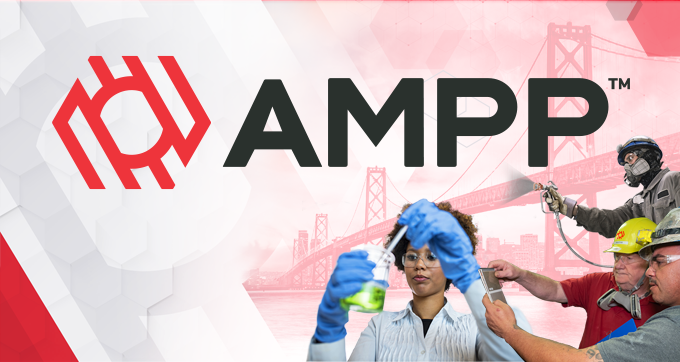Bob Chalker served as CEO of NACE International from 2010 through 2020, and he’s led the newly formed Association for Materials Protection and Performance (AMPP) — comprised of legacy organizations NACE and SSPC: The Society for Protective Coatings — since its official launch in January 2021.
But in July 2023, Chalker is retiring from his post, and a new CEO will be named prior to the 2023 AMPP Annual Conference + Expo next March. Both Chalker and his replacement are expected to meet with members and leaders from across the corrosion control and protective coatings industry in Denver, Colo., as part of the flagship event.
To discuss the motivations behind his decision to retire, his career legacy and highlights, and the upcoming transition process, Chalker addressed the situation on a recent AMPP Publications podcast. Read on for a partial Q&A and listen for the complete interview, which is embedded at the bottom of this article.
Q: What was it that made July 2023 the right time for you to step away?
Chalker: This decision came together fairly quickly. Now, I would be less than truthful to say that the idea of retirement hasn’t been somewhat on my mind for a little while. I’m 61 years old and have been at this a long time. So I’ve been planning for retirement like everybody else does, financially and in other ways. It’s sort of been in the planning process, but I really didn’t have it. targeted or was necessarily working towards it until my wife and I were on vacation.
The first week of August, we go with a group of friends and rent a lake house in a Table Rock, Missouri, area. One of the couples that was there, they had put their retirement in place. We were discussing it one night… and it really just got my wife and I thinking. My wife looked at me one morning and said, “Why can’t you retire? And I said, “Maybe we can.” So we spent several weeks looking at financials, where we’re going to live, and what we can do with the time that we get.
Then, a couple other things came into play. My dad was most incredible father, but he had two things in his life. He had his kids, his family, his wife, and his work. And he worked until his early 80s. I just remember thinking, that’s not what I want to do.
A year or so after he did retire, he passed away. I think part of the reason is he did not have other things in his life that energized and kept him motivated. That was the other lesson I learned from watching him. As great as he was, as a father, you reach a point where you’ve got to make sure you have other things in your life. So we’ve always been very good about doing volunteer work and being engaged in the community, and with friends and other things.
One of the things that has been a calling for me for some time is my Christian faith. It’s very important to me, and I’ve been a believer since my 20s. I’ve been very involved, and it has guided most of what I have done in my life. But I've always had a bit of a calling to learn more about my faith. And there’s an opportunity to do some seminary work next year, which starts in the August timeframe. That sort of helped drive the timing. So, all of this is coming together.

Q: What is the path forward for AMPP, in terms of actually identifying and naming your replacement?
Chalker: So, I let the board [Board of Directors] know at the first of September. They’ve been awesome to work with, and they’re taking it very serious. A search committee has been named, and that search committee has been working for a couple of months now. They have identified a search firm to use.
There is a timeline that has been built, and the timeline is targeting that my replacement is named prior to annual conference [2023 AMPP Annual Conference + Expo next March in Denver, Colorado]. Our hope is that they would be able to attend annual conference.
The search for a CEO can take a long time, and it can be a very dragged-out process. Because it’s an important decision, and it’s a difficult decision. I do think they’re focused on an accelerated path, and there’s some things that give them optimism. Number one is we have outstanding internal candidates, or potential candidates, since they haven’t called yet for candidates. But we have really qualified internal people.
This is a very well-respected organization, and the job is really a top job. So there will be strong outside candidates, as well, and I expect the search should go pretty quickly. As far as my role, other than making sure it gets off to a good start and that we do everything the right way, I don’t have a lot of say in it. That’s the best practice.
Associations are different than businesses. It’s not uncommon in a business environment for the CEO to groom their replacement, or have a big say on who would step into those shoes. You see that frequently, unless the CEO has gotten very sideways, for some reason. But that’s not the practice when it comes to a nonprofit association world.
One of the things we’ve got to remember is this organization, it belongs to the members. As staff, we are stewards of it, and we take care of it, and we help lead it and make it successful… but we don’t own it. It’s theirs. There’s no stock, there’s no ownership. In the end, it is the members’ decision. So my job is to help the members make the best possible decision they can make.
They’ve got some things they need to consider. For example, are they happy with the path that the organization is on, and the work that’s been done thus far? Do they want to make a change? Do they want to stay consistent with the direction they’ve been on? Do they want an experienced CEO? Do they want to bring somebody in, who may be an up and comer. By the way, it was in my case. This was my first CEO position. It’s not unusual to see that happen, particularly in a time now where there’s a lot of retirements, and a lot of people leaving the industry as a whole.
They need to decide whether they want an association professional, or do they want somebody out of [our] industry. So, they’re going through a discerning process to determine what kind of candidates they want. When that’s done, they’ll start the search process. Overall, I’m really pleased with how serious they’ve taken it and how they’ve gotten to work, and how methodical they’ve been. All of that is going to lead to a quality decision in a quick timeframe. They’re on the right track and have really been exemplary in their work.

Q: What do you think your legacy is here?
Chalker: The merger is definitely one, for sure. That’s something that had been tried multiple times before, and it was unsuccessful. I can’t take all the credit for that. In fact, I only take part of it. We had the right member leaders at the right time, and we have the right staff on both organizations, the right commitment, and the right approach. That truly was a team effort, but it will be one of the things that when I look back on my career, I’ll take great pride in and see as a positive.
I think the second [part] is the the staff. I’ll tell a little story. I had been at NACE about two years, and I was having dinner with a gentleman who I consider a mentor, and a friend who had been CEO for about 10 years at that point. He was a bit ahead of me on his career path. He made a statement to me. He said, “I love my staff, I love and trust and everything about my staff.”
I walked away from that dinner asking myself, “Can I say that about the organization that we had” I couldn’t. That’s not necessarily a criticism of the staff who were there at the time, but it was a statement on the relationship I had with the staff, and I think it was a statement on how serious we were taking our roles and responsibilities. Were we positioning ourselves to truly be leaders in the organization?
That conversation led to things like the Leadership Academy that we’ve put in place, as well as some of the decisions we made around hiring practices, and the idea that we’re going to get the very best talent, wherever we can get it. Interestingly enough, that prepared us for COVID, because we had hired a number of people in different locations around the world. Because not everybody wants to live in Houston, Texas.
It also led us to make decisions about how we communicate with one another, and about building the culture that we built here, together. As the leader, I can define what the culture would be or should be, but I can’t make it happen. Each individual makes it happen every day with every interaction.
One of the things I do, I meet with employees on a regular basis. One way is “Coffee With Bob,” which is basically a cross-section of people. I sit down, we have coffee, and we just talk. One of the questions I always ask is what brought [that person] to AMPP. “Why did you come here?” Usually, the answer is, “I applied because I was looking for a job,” or, “I knew somebody that worked here.” In most cases, they didn’t know much about the organization.
The second question I always ask is, “Why do you stay?” Inevitably, the answer is the people or the culture. I take a lot of pride in that. I think that by building an organization that has an incredible culture, we can overcome anything. I see it as probably the most important role that a CEO can play. It’s making sure you have the right team with all the tools and the things they need to be successful, and creating an environment or a culture that thrives.
The complete interview can be listened to below.
Source: AMPP, www.ampp.org.